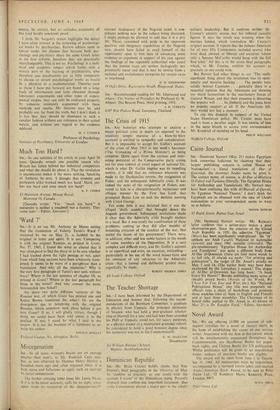The Crisis of 1915
SIR.---Any historian who attempts to analyse a major political crisis in depth (as opposed to the relatively simple exercise of a blow-by-blow account) is 'entitled to sympathy and consideration. But it is impossible to accept Dr. Gollin's account of the crisis of May 1915 in last week's Spectator ('The Unmaking of a Prime• Minister') as being complete. Quite apart from the curious and inter- esting portrayal of the Conservative party crying out for state control of every aspect of national life. which is what Dr. Gollin implies was its impelling motive, it is odd that no reference whatever was made to the Dardanelles reverse, the resignation of Fisher, and the subsequent Admiralty crisis. It was indeed the news of the resignation of Fisher, con- veyed to him in a characteristically mysterious and oblique manner by the First Sea Lord, that prompted Bonar Law to seek his decisive meeting with Lloyd George.
For some time it was believed that it was the alleged 'shells scandal' that brought down the Asquith government. Subsequent revelations made it clear that the Admiralty crisis brought matters to a head. But it was surely the combination of these problems, coming as they did after months of mounting criticism of the conduct of the war, that sealed the doom of the government? There were. in addition, other and less noble factors in the minds of some members of the Opposition. It is a very complex and difficult story, and Dr. Gollin's account is so superficial and even, on occasion, misleading— particularly in his use of the word laissez-faire and his omission of any reference to the Admiralty crisis—that a formal and deliberate protest must, regretfully. be made.
All Souls College. Oxford
ROBERT RHODES JAMES


































 Previous page
Previous page